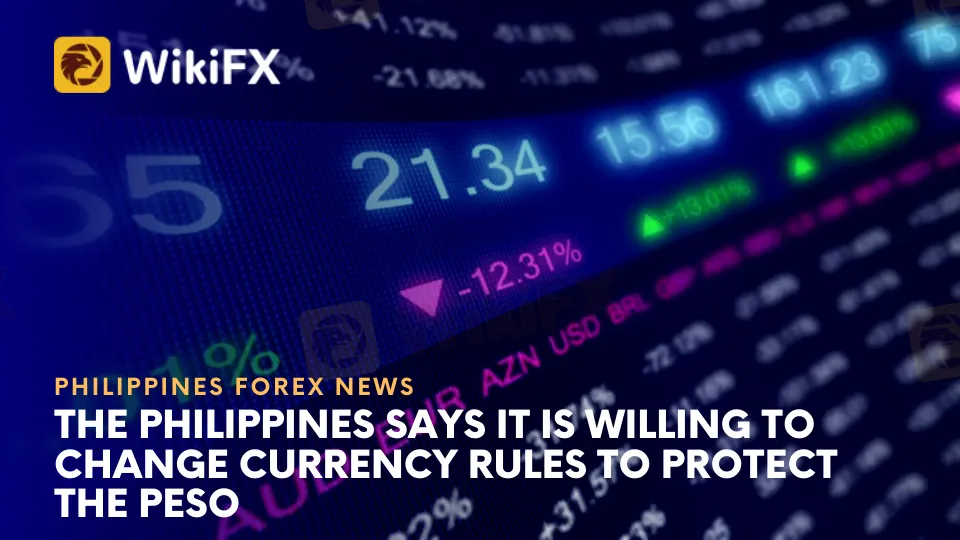简体中文
繁體中文
English
Pусский
日本語
ภาษาไทย
Tiếng Việt
Bahasa Indonesia
Español
हिन्दी
Filippiiniläinen
Français
Deutsch
Português
Türkçe
한국어
العربية
The Philippines Says It Is Willing To Change Currency Rules To Protect The Peso
Abstract:The Philippine central bank said it may tweak foreign-exchange policy to assist reduce speculation, emphasizing its preparedness to react to inflationary dangers despite the peso's recent gains.

The Philippine central bank said it may tweak foreign-exchange policy to assist reduce speculation, emphasizing its preparedness to react to inflationary dangers despite the peso's recent gains.
Dollar purchases thought to be “speculative,” or those without underlying client transactions, have surged and are putting pressure on the peso, according to the Bangko Sentral ng Pilipinas in an email on Friday. It replied to inquiries submitted on October 17, when the peso hit a new low of 59 pesos to the dollar.
The BSP said, “As an inflation-targeting central bank, the BSP will continue to react to currency rate fluctuations to the extent that they influence or constitute a danger to the inflation forecast.”
The BSP said that policies such as foreign-exchange position limitations and risk weights for non-deliverable futures are in place to prevent risk-taking behavior. These “may be changed countercyclically to avoid financial imbalances.”
Currently, a bank's consolidated net open foreign currency position cannot exceed 25% of its qualifying capital or $150 million, whichever is less.
The Philippine peso, Southeast Asia's poorest performer this year, climbed 0.2% versus the dollar at 2:30 p.m. local time to 57.27 after the BSP's previously announced 75-basis-point key rate rise on Thursday. This quarter, the currency recovered more than 2%, reversing the year's losses.
The BSP also said that it employs moral suasion to reduce speculation and lately “encouraged banks to cooperate” to assist maintain the currency market “orderly.”
Stay tuned for more Forex news.
Download the WikiFX App from the App Store or Google Play Store to stay updated on the latest news.

Disclaimer:
The views in this article only represent the author's personal views, and do not constitute investment advice on this platform. This platform does not guarantee the accuracy, completeness and timeliness of the information in the article, and will not be liable for any loss caused by the use of or reliance on the information in the article.
Read more

OctaFX Flagged by Malaysian Authorities
OctaFX has been officially listed on warning lists by both Bank Negara Malaysia (BNM) and the Securities Commission Malaysia (SC). These alerts raise serious concerns about the broker’s status and whether it is legally allowed to operate in Malaysia.

TradingPRO: A Closer Look at Its Licences
In an industry where safety and transparency are essential, the regulatory status of online brokers has never been more important. For traders seeking to protect their capital, ensuring that a platform operates under recognised and stringent oversight can make all the difference. Keep reading to learn more about TradingPRO and its licenses.

Oil Price Breakout Incoming? Investors Should Stay Alert
Oil prices are hovering around a critical level, with potential yet to be fully unleashed. Investors must prepare for sudden changes.

New SEBI Regulations on Intraday Trading
The Securities and Exchange Board of India (SEBI) has implemented revised regulations on Intraday trading, with effect from November 20, 2024. These regulations are meant to lessen risks and prevent speculative trading practices.
WikiFX Broker
Latest News
SkyLine Guide 2025 Malaysia: 100 Esteemed Judges Successfully Assembled
Vantage Markets Review 2025: Trusted Forex and CFD Trading Since 2009
Why STARTRADER Is Popular Among Traders?
A Guide to Intraday Forex Trading You Can't Miss Out
CONSOB Blocks Access to 13 Unauthorized Investment Websites
TradingPRO: A Closer Look at Its Licences
The world could be facing another ‘China shock,’ but it comes with a silver-lining
New SEBI Regulations on Intraday Trading
Everything You need to know about Barath Trade
IronFX Broker Review 2025: A Comprehensive Analysis of Trustworthiness and Performance
Currency Calculator


